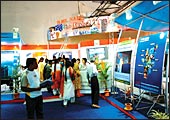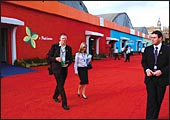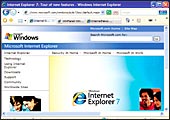|
Everyone
knows that the best way to exercise is to do both-cardiovascular
as well as weight training. But which do you do first? Cardio,
which burns calories and is a sure-shot way to cut the flab? Or
weight training, which makes your muscles grow bigger and stronger?
You will have heard different things from different people. Some
will tell you to do cardio on an empty stomach because that's
the best way to burn body fat. Others will tell you never to do
cardio before you lift those dumb-bells because the running, cycling
or rowing (or whatever form of cardio you do) can tire you out
and leave you with less energy to work with weights. Yet others
will tell you never to do cardio on the same day as weight training.
So what's the real deal? Should cardio go
before or after? Should you eat before working out or head to
the gym on an empty stomach? As with most questions we face in
life, there is no simple answer. They all depend on you, your
body and its rhythm.
The first thing to recognise is that you
know your body the best. Much better than a trainer with fancy
qualifications, a book written by some expert, or something you
watched on a TV fitness show. First, you need to find the most
convenient time for you to exercise. Then stick to it. That becomes
the best time for you to work out. Now, about the form of cardio
you should choose. While jogging, cycling, rowing or a session
on the elliptical cross-trainer all burn calories and, eventually,
turn out a sleeker, slimmer you, it's completely your choice as
to which one you want to do. Any one of them is good but the simple
no-brainer is that the ones that work more muscle groups are the
better ones.
As for exercising on an empty stomach, it
makes no sense. You need to eat something-a carbohydrate bar or
even a handful of nuts and a glass of milk-to give you the energy
to power yourself through your workout. Try and eat at least 45
minutes before you hit the gym.
And what of the before and after question-should
you do a cardio session before you lift weights or the other way
around? It is widely believed-and I fall into that broad swathe
too-that a short 10-12 minute warm-up cardio session before you
hit the weight rack actually maximises the effectiveness of weight
training. Your bigger cardio session is best left for later. Ask
your body. Can it do a long cardio session (25-40 minutes) and
then lift dumb-bells or barbells or whatever it is you want to
do with weights? If you can do cardio and weights on alternate
days that's an ideal situation-you won't be tired before either
of them. But as I said, it's you and your body that will have
to find the right solution.
-Muscles
Mani
write to musclesmani@intoday.com
Caveat: The physical exercises described
in Treadmill are not recommendations. Readers should exercise
caution and consult a physician before attempting to follow any
of these.
FIVE
STEPS FOR A FIT EXECUTIVE
Board
meetings, conference calls, project reports and cross-country
flights-for many top executives, the typical workday starts at
dawn and goes well past dusk. Here are some recommendations to
stay fit.
What to eat: Says Dr S.K. Jain, Senior
Consultant, Sir Ganga Ram Hospital: "Take a variety of foods;
eat plenty of nuts, whole grains and legumes. Get plenty of iron
by eating lots of spinach, beans, and iron-fortified foods."
Omega-3 fatty acids, which are abundant in fish, are highly recommended.
What to drink: First, always prefer
water. Moderate drinking (one standard-size drink a day for women;
two drinks a day for men) can play a role in reducing the risk
of several serious diseases, including coronary heart disease,
diabetes, obesity and cognitive disorders. This applies to all
forms of alcohol including beer, spirits, or cider and not merely
to red wine, as is popularly believed.
Reduce stress: Weight lifting is great
for reducing stress. "Take regular time off from your computer
terminals. Listening to music can be a great stress-buster for
some people," says Dr Jain. Set aside some time for meditation.
Go for routine tests: Says Dr Jain:
"Based on your age, health history and lifestyle, your healthcare
provider can determine how often you need to be examined and screened
for certain diseases and conditions." These include high
blood pressure, high cholesterol and diabetes."
Make your office comfortable: Arranging
your environment to fit your needs and prevent injury. Make your
workplace comfortable; it will improve your productivity and quality
of life.
-Manu Kaushik
FLOTSAM
Bangalore
IT.out
The ninth annual IT jamboree was a pale shadow
of the event it once was.
 |
| Bangalore's IT jamboree: Lacking the
zing of previous years |
 |
| Foreign delegates: They came, they saw,
and were disappointed |
When
it started in 1998, Bangalore it.com-as it was called then-was
a platform to showcase India's then emerging prowess in the it
sector and Bangalore as a global brand; companies also showcased
their latest products and services. The show, dreamt up over a
cup of coffee by two bureaucrats, was timely and caught the imagination
of both the industry and the government.
Having covered the event right from inception,
I still remember the excitement it generated in the local it industry.
Companies vied with one another to put their best foot forward;
the panel discussions saw heated arguments on the issues of the
day, most importantly India's emerging it giants pulled out all
stops to catch the attention of visiting buyers.
That was then. The ninth edition of the event,
which took place from October 28-31 in the backdrop of the majestic
Bangalore Palace, lacked the zing of the previous years. Overcast
skies and a regular drizzle were not the only dampners. None of
the it majors, even ones like Wipro and Infosys, which are headquartered
in Bangalore, participated; ditto for MNCs like IBM, Microsoft
and Sun Microsystems. The organisers (Software Technology Parks
of India and the Government of Karnataka) say more than 200 companies
participated, 16 foreign countries booked pavilions and 70,000
people visited the fair. True, but like most statistics, what
these numbers reveal is interesting but what they hide is essential.
The foreign delegations were just showcasing themselves and trying
to attract the attention of investors (like the 'Come to Bavaria'
pitch); then, there were the Tamil Nadu and West Bengal teams
trying to lure Bangalore's it companies to their respective states.
Realtors hawking space, in fact, outnumbered genuine it companies.
And many of the other stalls were taken up by satellite radio
service providers, matrimonial websites and companies espousing
organic foods.
A Mysore-based it company called Software
Paradigms was trying to attract talent to come and work for it
("Good pay, better lifestyle," the person manning the
stall was saying). For no particular reason, there were three
gold-plated eggs placed at the entrance to its stall. The irony
couldn't have been more stark. Figuratively, it denoted what it
had done for the city; but the state government still hasn't realised
that the eggs have hatched, and the hatchlings have grown into
multi-billion dollar companies, ready to fly away unless it fixes
the city's crumbling infrastructure.
"Realty, hr, utilities and travel services
companies far outnumber tech companies," says a disappointed
Felix Donoso of Management Systems and Solutions, a Spanish company.
A spokesperson of a mid-tier itservices company, who did not want
to be identified, says: "Participation is a waste of time.
The quality of visitors is abysmal. The government has converted
this event into a jamboree and event managers are just interested
in selling space. Like Comdex, that was shut down after it lost
relevance, it is log out time for Bangalore IT.in (as the event
is now called)."
Expectedly, B.V. Naidu, Director, STPI and
M.N. Vidyashankar, Karnataka it Secretary, defended the event.
"Domestic majors have not participated because they do not
see any need to showcase themselves any more. But this event still
retains relevance for small and mid-sized companies," says
Naidu.
The bottomline: unless the government makes
it a more market-driven B2B event, the end is well nigh for Bangaloreit.in.
-Venkatesha Babu
PRINTED
CIRCUIT
An All-new Surf!
Two new browsers, and an all new war!
By Kushan Mitra
Getting It Right. Almost!
 I
have been playing around with beta versions of Microsoft Internet
Explorer 7 for some time, and well, to be technically correct-it
is called Windows Internet Explorer 7. First impressions? Man!
it is so much better than Internet Explorer 6-tabbed browsing,
extremely high levels of security, including the ability to see
if a site is 'fake' or not (faking websites is a common way for
online criminals to target gullible internet users), preventing
malicious software from running, and in-built Really Simple Syndication
(RSS) abilities. I
have been playing around with beta versions of Microsoft Internet
Explorer 7 for some time, and well, to be technically correct-it
is called Windows Internet Explorer 7. First impressions? Man!
it is so much better than Internet Explorer 6-tabbed browsing,
extremely high levels of security, including the ability to see
if a site is 'fake' or not (faking websites is a common way for
online criminals to target gullible internet users), preventing
malicious software from running, and in-built Really Simple Syndication
(RSS) abilities.
Internet Explorer 7 has actually taken the
good things of Firefox and made an extremely slick package out
of it. For example, the top right corner of Firefox includes a
user-adjustable search bar; this is now available on Internet
Explorer as well. Even more surprisingly, the default search engine
on ie7 was Google and not Microsoft's new 'Live' search. IE7 surprised
me with the "one-touch" RSS for your favourite readers
integrating well with Bloglines and Google Reader. Much like Firefox,
Internet Explorer 7 comes with a whole gamut of "official"
add-on software (plug-ins) which you can install to enhance and
customise your browsing experience.
But there is one catch with ie7-the 'Windows
Validation' process that you have to undergo when installing.
I had no issues since I possess a genuine version of Windows,
but even then, validation is a time-consuming process. And, given
that according to Microsoft's own estimates-some 80 per cent plus
home users in India use pirated versions of Windows, they will
not be able to use ie7. As simple as that!
Download from www.microsoft.com/ie
Better, But Not Bigger!
 I
started using Firefox almost two years ago, even before the first
official release, so effectively this is the fourth major iteration
of the browser I'm using (version 0.7, 1.0, 1.5 and now 2.0),
and honestly, I love Firefox, because Internet Explorer 6 was
crappy. I
started using Firefox almost two years ago, even before the first
official release, so effectively this is the fourth major iteration
of the browser I'm using (version 0.7, 1.0, 1.5 and now 2.0),
and honestly, I love Firefox, because Internet Explorer 6 was
crappy.
Firefox 2.0 still has a lot of the things
that made me love Firefox in the first place. It is still an incredibly
small download-the interface is still very slick and infinitely
customisable with themes and add-ons-but the problem upgrading
was that a lot of the old add-ons I had installed on Firefox 1.5
were not compatible with version 2.0 but similar add-ons were
made available soon enough.
This version is slicker in the way it does
several things and one feature that got me hooked was the 'Control+Shift+T'
which restores the last closed tab; this is quite useful when
you close a tab accidentally, which happens quite often with me.
And even though you will need to download all sorts of plug-ins
from Flash and Shockwave players to font support, Firefox will
remain the browser of choice for many-simply because it doesn't
have that "validation" process.
Still the better browser? Well, ie7 is very
good, and doesn't cover huge swathes on the top of your screen
with pointless buttons. But, the Firefox environment is superior
with more plug-ins and options. Because of its open-source nature,
security loopholes tend to get plugged faster than on IE. Ideally,
download both and then see which one you prefer. I prefer the
open-source browser mainly because I'm very used to it, but ie7
is impressive.
Download from www.getfirefox.com
|








 I
have been playing around with beta versions of Microsoft Internet
Explorer 7 for some time, and well, to be technically correct-it
is called Windows Internet Explorer 7. First impressions? Man!
it is so much better than Internet Explorer 6-tabbed browsing,
extremely high levels of security, including the ability to see
if a site is 'fake' or not (faking websites is a common way for
online criminals to target gullible internet users), preventing
malicious software from running, and in-built Really Simple Syndication
(RSS) abilities.
I
have been playing around with beta versions of Microsoft Internet
Explorer 7 for some time, and well, to be technically correct-it
is called Windows Internet Explorer 7. First impressions? Man!
it is so much better than Internet Explorer 6-tabbed browsing,
extremely high levels of security, including the ability to see
if a site is 'fake' or not (faking websites is a common way for
online criminals to target gullible internet users), preventing
malicious software from running, and in-built Really Simple Syndication
(RSS) abilities.  I
started using Firefox almost two years ago, even before the first
official release, so effectively this is the fourth major iteration
of the browser I'm using (version 0.7, 1.0, 1.5 and now 2.0),
and honestly, I love Firefox, because Internet Explorer 6 was
crappy.
I
started using Firefox almost two years ago, even before the first
official release, so effectively this is the fourth major iteration
of the browser I'm using (version 0.7, 1.0, 1.5 and now 2.0),
and honestly, I love Firefox, because Internet Explorer 6 was
crappy.